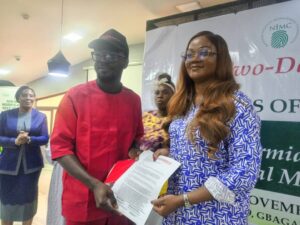
Nigeria will not be dumping ground for chemicals banned in other countries — NAFDAC vows
The National Agency for Food and Drug Administration and Control NAFDAC has dispelled the insinuation that 40 percent of the registered brands (not actives) of pesticide products used in Nigeria are either banned or restricted for use by EU, thereby endangering the lives of people, animals, and the environment in Nigeria.
The Director General of NAFDAC, Prof Mojisola Adeyeye stated this in her remarks while speaking at the opening ceremony of a two-day NAFDAC top management committee (TMC) meeting in Lagos at the weekend.
Prof Adeyeye, in a statement by Sayo Akintola, Resident Media Consultant, on Sunday, said that NAFDAC is ISO: 900: 2015 Quality Management System (QMS) certified organization that has put in place procedures to enable the Agency to take regulatory decisions to determine whether an active ingredient should be banned or restricted.
NAFDAC (Nigeria) is a signatory to the international Convention that banned chemicals and pesticides such as the Rotterdam Convention, an international treaty designed to facilitate informed decision-making by countries with regard to trade in hazardous chemicals and Pesticides. Chemicals banned by international convention have been phased out and never entertained for registration or given import permits as raw materials for production.
As a sovereign state, she noted that Nigeria has regulatory bodies empowered to regulate and control the production, importation, exportation, distribution, advertisement, sale, and use of such chemical products.
She pointed out that NAFDAC is saddled with the responsibility of ensuring that chemical products produced in Nigeria and those being imported into the country meet the prerequisite in-country approval as well as international standards, adding that NAFDAC has a stringent requirement of ensuring that any pesticide to be imported into Nigeria is on the Market in the exporting country the current Free Sale Certificate is authenticated by the Nigerian Embassy in the exporting country.
The NAFDAC boss also stated that in order to ensure that only active ingredients approved by NAFDAC are allowed into the country, NAFDAC Appointed Testing Agents (CRIA) and Laboratories to conduct tests and forward results to the Agency before any Pesticide is shipped from countries that are major exporters of Agrochemicals into Nigeria.
The World Health Organization (WHO) names four toxicity classes of pesticides:
Class I – a: extremely hazardous
Class I – b: highly hazardous
Class II: moderately hazardous
Class III: slightly hazardous
Class U: Unlikely to present acute hazard
“These classifications are for guidance purposes to enable users to take necessary precautionary measures to ensure the safety of food, humans, animals, and the environment,” she said.
She, however, assured Nigerians that adequate quality control tests are carried out by the Agency before granting certifications for all products that are either imported or manufactured within the country. In addition, she disclosed that the field trial evaluation is conducted in collaboration with research institutes in Nigeria to determine the safety, quality and efficacy of new molecules as well as inspection of manufacturing facilities to establish that a Good Manufacturing Practice (GMP) is in place to ensure that product manufactured meets the quality standard specification for the intended use.
“Other regulatory activities include but are not limited to the issuance of authority to clear, continual sensitization and awareness exercises for relevant stakeholders on safe and responsible use of pesticides, Post-Marketing Surveillance to Mop-up fake/unregistered/expired products, and the Destruction of seized products.”
According to her, the EU uses much lower Maximum Residual Limits (MRLs) than most other CODEX member countries, hence the EU raised observations for the codex secretariat and subsequently WTO to take note. With this, she explained that products with active ingredients that are accepted by other codex member countries including Nigeria are not allowed into the EU.
Prof. Adeyeye, however, pointed out that the lack of scientific data in Nigeria has been identified as a gap that explains why the country participants refrain from raising observations during codex meetings, therefore, have no choice but to go by the general Codex Alimentarius resolutions.
The DG has called on all relevant research institutions to generate enough data and make available such data for the Nigerian team that attends Codex Committee on Pesticides Residues (CCPR) to advance the country’s interest.
Prof. Adeyeye, however, intimates that all the pesticides approved for use by NAFDAC are also in use in other parts of the world except Europe without any fuse, asking rhetorically why this campaign was not taken to the US, Latin America, or Asia where the products are also being used?
She called on investors to feel free and confident to invest in Agricultural production in Nigeria. She reiterated her determination and assurance to Nigerians that no stone would be left unturned to ensure that food products available to Nigerians for consumption are safe and wholesome. The Agency in the last four years of her administration has been repositioned to effectively regulate all agricultural inputs such as pesticides, and agrochemicals amidst other NAFDAC-regulated products.
All these groups of inputs are known to have an impact on the food chain. The quality and safety of the inputs have a direct impact on the food from the farms and the health of humans, animals, and plants.
“In line with the federal government agenda and investment in agriculture, the Agency wishes to encourage investors to consider investing in agricultural production so that creation of jobs and ability to feed ourselves as a nation without depending too much on foreign exchange can be achieved,” she said.
It is noteworthy that a lot of regulatory activities have been carried out to ensure that all inputs regulated by NAFDAC required in the production of safe food are safe, efficacious and of the right quality.
In reciprocating to this effort, she added that local production of food is highly encouraged stressing that NAFDAC, in the last four years, has reviewed its regulations, guidelines and strengthen collaboration with MDAs and stakeholders to ensure effective regulations.
According to her, such collaborative effort has been recorded in agrochemicals regulation, adding that NAFDAC has reviewed the safety of all registered agrochemicals in Nigeria in consultation with relevant stakeholders, initiated four years’ phase-out plan for obsolete and some hazardous agrochemicals.
“Such phase-out plan is currently running for Paraquat, which will be phased-out in 2024 and Atrazine in 2025 while 100ml pack size of Dichlorvos (DDVP) is already banned’’ due to inappropriate use, she said. So far about thirty (30) pesticides have been banned in Nigeria. The general public is advised to visit the NAFDAC website (www.nafdac.gov.ng) for detail of banned pesticides.
“A prudent and responsible use of pesticides and agrochemicals is the paramount caution in the use of the products in Nigeria. The Agency’s most recent effort in the support of advocating judicious use along with relevant stakeholders such as CropLife Nigeria and Nigeria Agro-Input Dealers Association (NAIDA) to train dealers/marketers of agrochemicals in Nigeria to be listed and in turn educate farmers on responsible use. This is extremely important to forestall the risk of mishandling, poor storage, unsafe exposure to the products and unregistered/banned agrochemicals in circulation. The Agency has over the years developed regulations in line with international best practices.”
Prof Adeyeye noted that globally, regulation is done in the interest and safety of the citizen. She pointed out that the EU for instance, restricted/banned the use of some agrochemicals on some crops or agricultural products due to safety concerns or lack of enough data and have made provision for alternatives that are readily available, affordable and accessible. These alternatives are not readily available in Nigeria for use.
She said the action was taken to safeguard a class of the population that consumes such crops, insisting that in such case it will be unscientific to do the same in Nigeria, where the class of crops in question are not grown here and the agrochemicals in question are not used on similar fresh crops in Nigeria. She further disclosed that the agrochemicals in question are still being produced in the EU and residue still exists in their fruits and vegetables.
The NAFDAC boss however called on all and sundry on the need for ethical and responsible use of regulated products, stressing that all should always buy and use registered products.
“The manufacturers’ instruction as indicated on the product label plays a significant role in achieving safe use of regulated products therefore, strict compliance to it is highly inevitable. NAFDAC also encourages and appreciates speedy information sharing on any regulated product for swift action when the need arises.”
Prof Adeyeye said NAFDAC has registered and is still registering organic fertilizers, biopesticides and biofertilizers to provide a wide range of choices for crop protection products to farmers, adding that the Agency would continue to call on all farmers to ensure strict compliance to all practices such as Good Agricultural Practice GAP, Good Hygienic Practice GHP, Good Storage Practice GSP amidst others.
In conclusion, she assured the public that NAFDAC as an Agency will never compromise the nation’s public health, environment and will not inflict undue hardship on Nigerians. Our watchword, customer-focused, Agency-minded remains the bearing of our focus.



